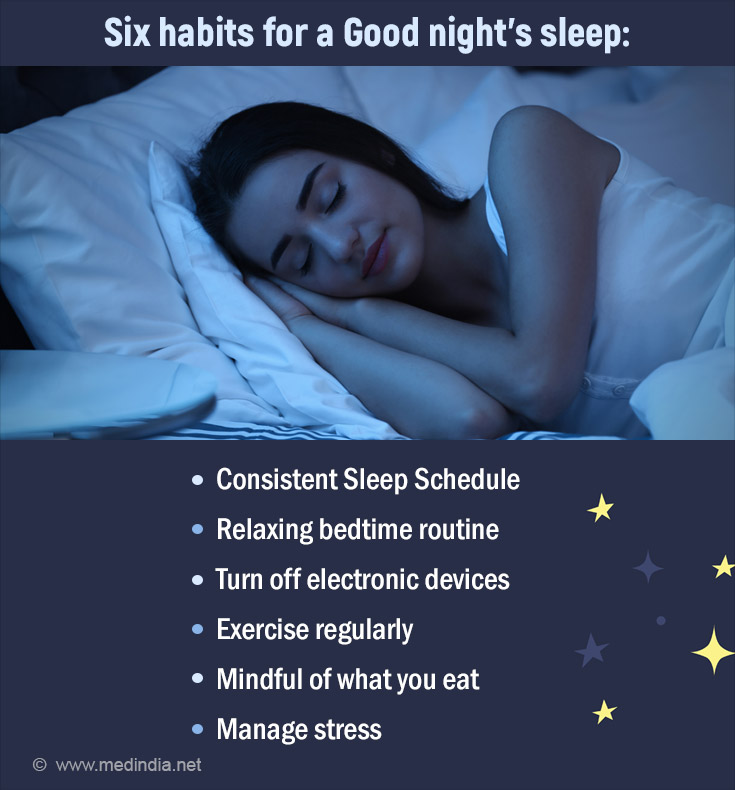- Bedtime Routines for Adults - (https://www.sleepfoundation.org/sleep-hygiene/bedtime-routine-for-adults)
- 8 healthy sleep habits - (https://www.mdanderson.org/publications/focused-on-health/healthy-sleep-habits.h13-1589046.html)
About
Sleep is a fundamental aspect of human health and well-being, playing a crucial role in maintaining physical, mental, and emotional balance. Despite its importance, many people struggle with establishing and maintaining healthy sleep habits. Understanding and implementing effective sleep habits can address common sleep disorders, such as insomnia or sleep apnea, and contribute to better overall health (1✔ ✔Trusted Source
Bedtime Routines for Adults
Go to source).
Did You Know?
7-8 hours of sleep can improve cognitive function, memory, and mood! #sleephealth #wellness
6 Habits to Improve Your Sleep
By incorporating these 6 key habits, you can become the maestro of your own sleep symphony, lulling yourself into a peaceful slumber (2✔ ✔Trusted Source8 healthy sleep habits
Go to source).
1. Become a Creature of Habit
Our bodies thrive on routine. This means going to bed and waking up at consistent times each day, even on weekends. Think of it like setting the rhythm for your internal clock, known as your circadian rhythm.
When your sleep schedule is consistent, your body naturally knows when to wind down for sleep and when to wake up feeling alert. This consistency helps regulate the production of melatonin, a hormone crucial for sleep. Imagine melatonin as the conductor of your sleep symphony, ensuring a smooth and timely transition between wakefulness and sleep.
2. Craft a Calming Countdown
Develop a relaxing bedtime routine that signals to your body it's time to wind down. This pre-sleep ritual should start about an hour before bedtime and involve calming activities such as:
- Taking a warm bath: The warm water helps relax your muscles and lowers your body temperature, mimicking the natural cooling that occurs during sleep.
- Practicing gentle stretches: Light stretches can ease muscle tension and prepare your body for rest.
3. Power Down for Dreamland
Those glowing rectangles might be tempting, but resist the urge! Turn off electronic devices before bed. The blue light emitted from smartphones, tablets, computers, and TVs disrupts sleep by suppressing melatonin production.
Blue light tells your body it's daytime, making it harder to fall asleep and stay asleep. Aim to power down electronics at least an hour before bedtime.
4. Move Your Body, Soothe Your Mind
Regular exercise promotes better sleep, but timing is key. Aim for 30 minutes of moderate-intensity exercise most days of the week. However, avoid strenuous workouts close to bedtime, as they can be too stimulating and leave you feeling energized. Consider relaxing exercises like yoga or gentle stretching in the evening to unwind. These activities promote relaxation and can improve sleep quality.

5. Fuel Your Body for Sweet Dreams
What you consume impacts your sleep. Avoid the following sleep disrupters:
- Heavy meals close to bedtime: These can take a long time to digest, causing discomfort and keeping you awake. Opt for a light, healthy dinner at least 2-3 hours before bedtime.
- Caffeine and nicotine: Avoid these stimulants for at least 4-6 hours before bedtime. Caffeine can block the effects of adenosine, a brain chemical that promotes sleepiness. Nicotine is also a stimulant and can interfere with sleep.
- Alcohol: While alcohol may make you feel drowsy initially, it disrupts sleep later in the night, leading to fragmented sleep and frequent awakenings.
- Sugary and spicy foods: Sugary foods can cause blood sugar spikes and crashes, disrupting sleep. Spicy foods can cause heartburn and
indigestion , making it difficult to get comfortable.
If you feel hungry before bed, opt for a light, healthy snack like a banana with almond butter or a small bowl of oatmeal.
6. Tame the Tension
Chronic stress can keep you wide awake. Stress hormones like cortisol can disrupt your sleep cycle. Find healthy ways to manage stress, such as:
- Meditation: Meditation helps quiet your mind and reduce stress hormones.
- Deep breathing: Deep breathing exercises can help calm your nervous system and promote relaxation.
- Journaling: Writing down your worries before bed can help clear your mind and allow you to focus on sleep.
- Reading: Reading a calming book can be a great way to de-stress and unwind before bed.
- Listening to calming music: Similar to your bedtime routine, choose calming music or nature sounds to promote relaxation.
By incorporating these habits into your routine, you'll create the perfect environment for sleep. Remember, consistency is key! The more you stick to these practices, the easier it will be to drift off to dreamland and wake up feeling refreshed and ready to conquer the day.












